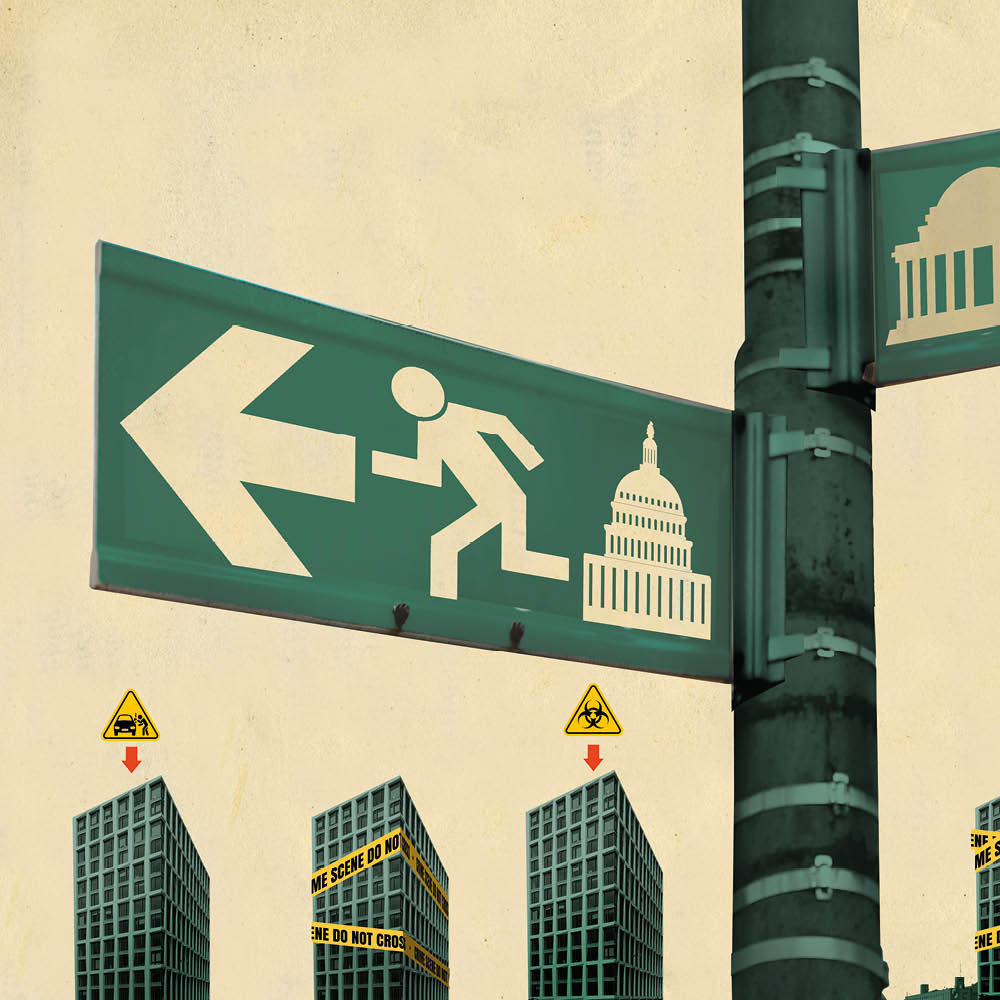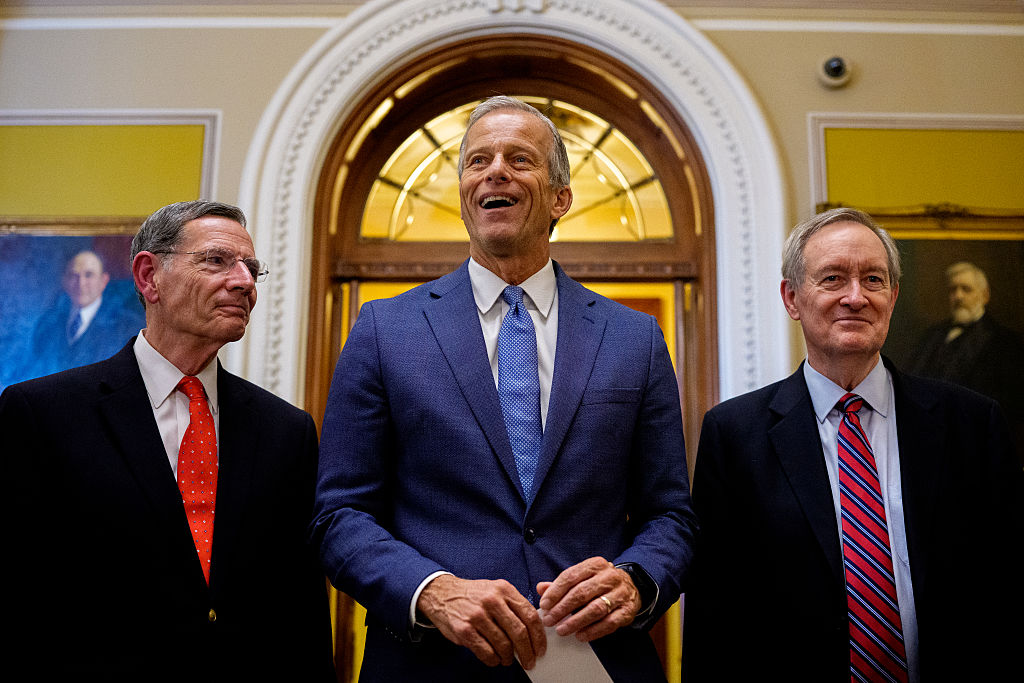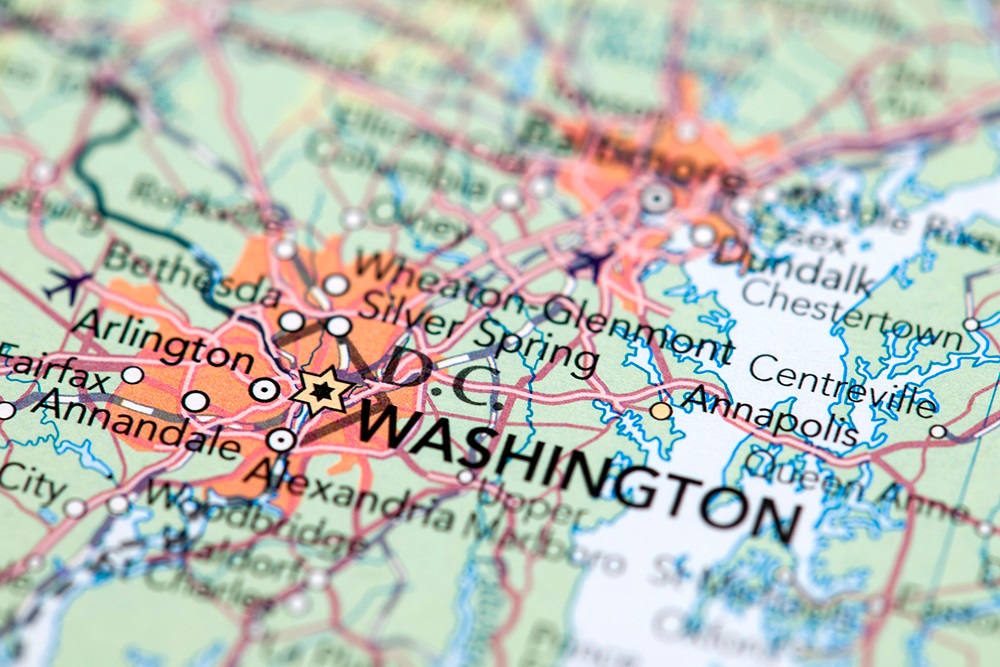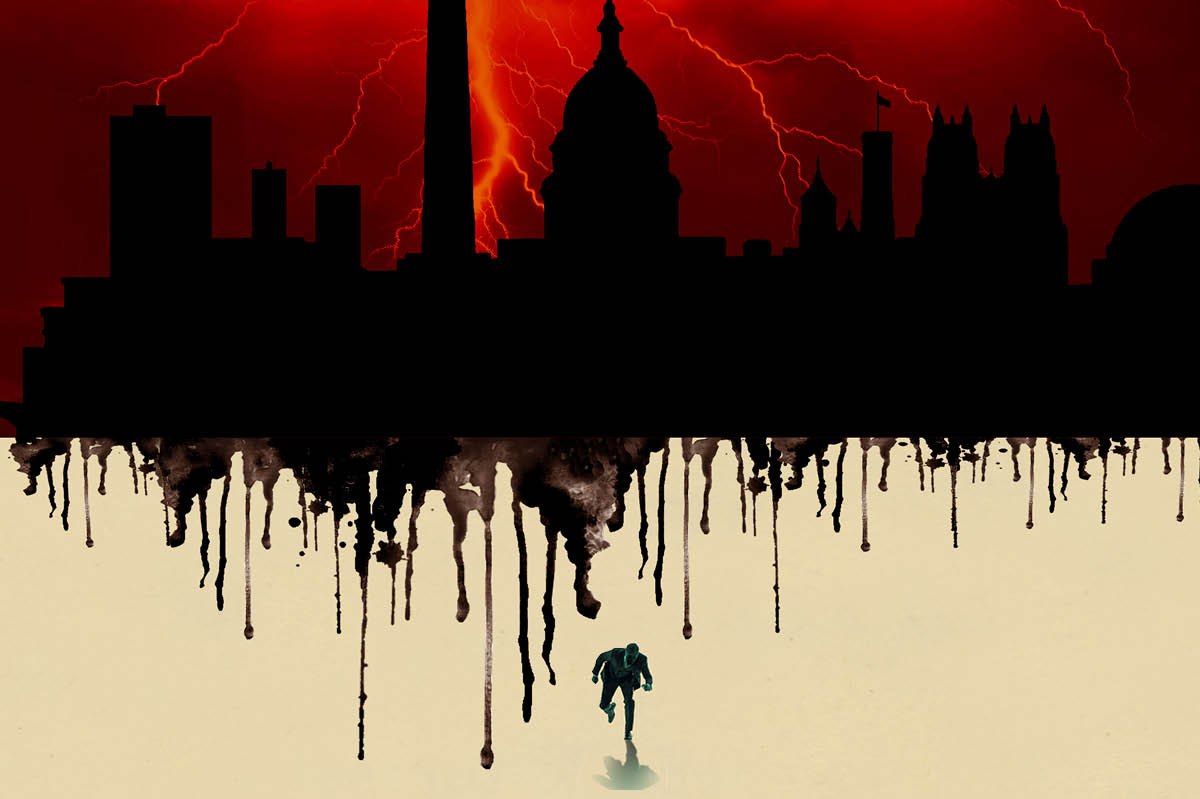I break up my working day by going on a three-mile jog around the Navy Yard neighborhood of Washington, DC, where I’ve lived for just over a year.
I leave my building, one of many newish luxury developments which has recently found itself a prime target for vehicle thefts; I pass by the barber’s whose windows were shot out on Friday and the doggie day care where on the same day an employee hit a pet that later died. As I cross N Street I glance down the block where, in October 2022, a man my age was killed in a drive-by shooting. I head south beyond the baseball stadium, where the July 2021 shooting of three people outside caused a sixth-inning suspension of play. I turn onto the waterfront path where someone was spotted with an automatic weapon this weekend. My route takes me past the naval base from which the neighborhood takes its name; garbage lines the riverbank and floats along the surface. I loop back up around the perimeter wall and go west down M Street, which splits DC Wards 6 and 8. A person committed suicide by jumping off the supermarket roof there, at around the same time as the firearm incident on Sunday. In the CVS across the street, the toiletries are locked up to prevent shoplifting and you have to track down a staffer to liberate your razor blades or shampoo. Just north of me is the nice apartment building where a Democratic congressman was carjacked in the fall. I make my way back, close to the Buffalo Wild Wings where an employee tried to shoot his coworker sometime in 2022. There are a number of vacant retail spots where new bars and restaurants had pledged to open. “Coming soon,” they promise. Sure they are. Back in my apartment, I stare at the lease renewal offer from my rental company, which proposes a $200 a month increase. Why would I agree to this, I wonder. Why would anyone?
This is far from the darkest period in the history of Navy Yard. Retreating troops burned it down in the War of 1812; the area was staffed by slaves as America industrialized and — as a result of hosting the Navy and factory workers — it long served as a locus for sex work and organized crime. But all that was supposed to be changing, thanks to a public-private effort to redevelop the area at the turn of the millennium.
The land on which strip clubs sat was seized through eminent domain and a new baseball stadium was built in their place; opportunistic property developers threw up premium modern apartment buildings and condominiums; the Department of Transportation moved in and the Navy encouraged contractors to take up office space close by. The professional class followed: lawyers, lobbyists, Hill staffers, members of Congress. Yes, there was a surge of urban crime in several cities after the pandemic — but many of them have since turned it around. Not DC. The 39 percent increase in violent crime last year renders the nation’s capital an outlier, but nowhere is the juxtaposition between the carnage and the sterile plate-glass environs more striking than in Navy Yard. It’s a failing experiment in gentrification.
The high-end apartment complexes in which neighborhood newcomers live are all carbon-copied, with their rooftop pools, twenty-four-hour gyms, stainless steel appliances, floor-to-ceiling windows for natural light. The easiest way to distinguish between them is by their scandals: do you live in the one that had Legionnaire’s bacteria in the pool, where the Iranian agents got raided? Perhaps the one up the street where Representative Cuellar got his car stolen? (They took his sushi, too.)
“Carjackings have become a joke,” Elissa De Souza, a Navy Yard resident and community activist, tells me. “If one person stole a car and they were strictly punished for it, would the others really do that? These people know that there’s no accountability. Just a slap on the wrist. So why wouldn’t anybody and everybody join in on the fun?” There were nearly 1,000 carjackings in DC last year — 2024 is maintaining the same pace, with eighty-four in the first two months.
You might think a rise in violent and property crime and decrease in employees going into the office would result in a price drop in the rental market: you’d be mistaken. Rents for studio apartments here remain at around $1,800 a month, with most one-bedroom apartments still north of $2,000. A lawsuit from the DC attorney general suggests an explanation: it accuses fourteen large residential landlords of delegating price-setting authority to an outside company, which uses “a centralized pricing algorithm to inflate prices.”
If renters are fairly stuck, businesses have started to flee. A Navy Yard franchise of Swingers, a putt-putt golf bar, opened and closed within a matter of months. Chic athleisurewear store Lululemon has also turned heel. “I did talk to the manager of Lululemon and it was really sad,” De Souza says. “They had to shut down because of crime. They were just robbed at gunpoint too many times.”
Will neighborhood residents follow? “I would have to get a car if we moved to Virginia,” a Capitol Hill staffer who lives in the area tells me. “I’ve had two different friends get held at gunpoint on the Metro during the day and don’t want the risk of that happening to me, especially with how many late nights there are working on the Hill.”
He’s far from the only one considering it — many who live in Navy Yard are fearful of the rising crime, but they don’t expect much to change. Instead, they’re adjusting their routines. “I’ve heard from people that dogs have been stolen while on walks,” says the Hill staffer. “Instead of having my fiancée walk our dog the three blocks to the Capitol, I drive to my parking garage and walk my dog around inside the House office buildings because I know that we won’t get attacked in there.”
Is help on the way? A conflagration of reasons — from lack of police funds, to slack sentencing, to bureaucracy and confusion over who’s actually in a position to fix things — suggest change is unlikely in the near future.
“If you ever sit in public court hearings, I feel like judges are sometimes scared,” De Souza says. “They’re not enforcing stricter, harsher punishments. And that’s coming from above, what they’re being told in the sentencing guidelines. If you’re not holding people accountable, that person goes onto the street and tells the next person, ‘Look, I got off for stealing like $500 or $1,000 worth of products from a convenience store.’And then the next person tells the next person.”
In late January the Department of Justice finally announced a “surge in law enforcement resources” to “target the individuals and organizations that are driving violent crime” in the District. Those efforts are likely to focus on neighborhoods on the other side of the Anacostia River from Navy Yard; they account for a large swath of the homicides in the capital. The surge will also have an impact on parts of Southwest Waterfront mere blocks from Nationals Park, which have seen several recent shootings. The torso of a missing person was found in a trashcan there over Christmas. “That area has always been bad,” De Souza says. “Housing is cheap there, there’s a lot of gangs and people that congregate around there. And then here comes Navy Yard — just because you put in these nice buildings and these nice restaurants and it attracts new people, it doesn’t necessarily make it a good area.”
Maybe that’s part of the problem — Navy Yard suffers from its developers’ naive assumption that megabucks investment could keep it from being affected by the problems that have always blighted the disadvantaged surrounding areas. But the bloodshed and chaos weren’t a defining trait of life here ten, even five years ago. The US attorney in DC, Matthew Graves, has only just taken action — but for many it will prove too little too late. I for one will not be sticking around to find out. My time in Navy Yard will end with my lease. I’m sure the sailors will be sad to see me go.
This article was originally published in The Spectator’s April 2024 World edition.























Leave a Reply